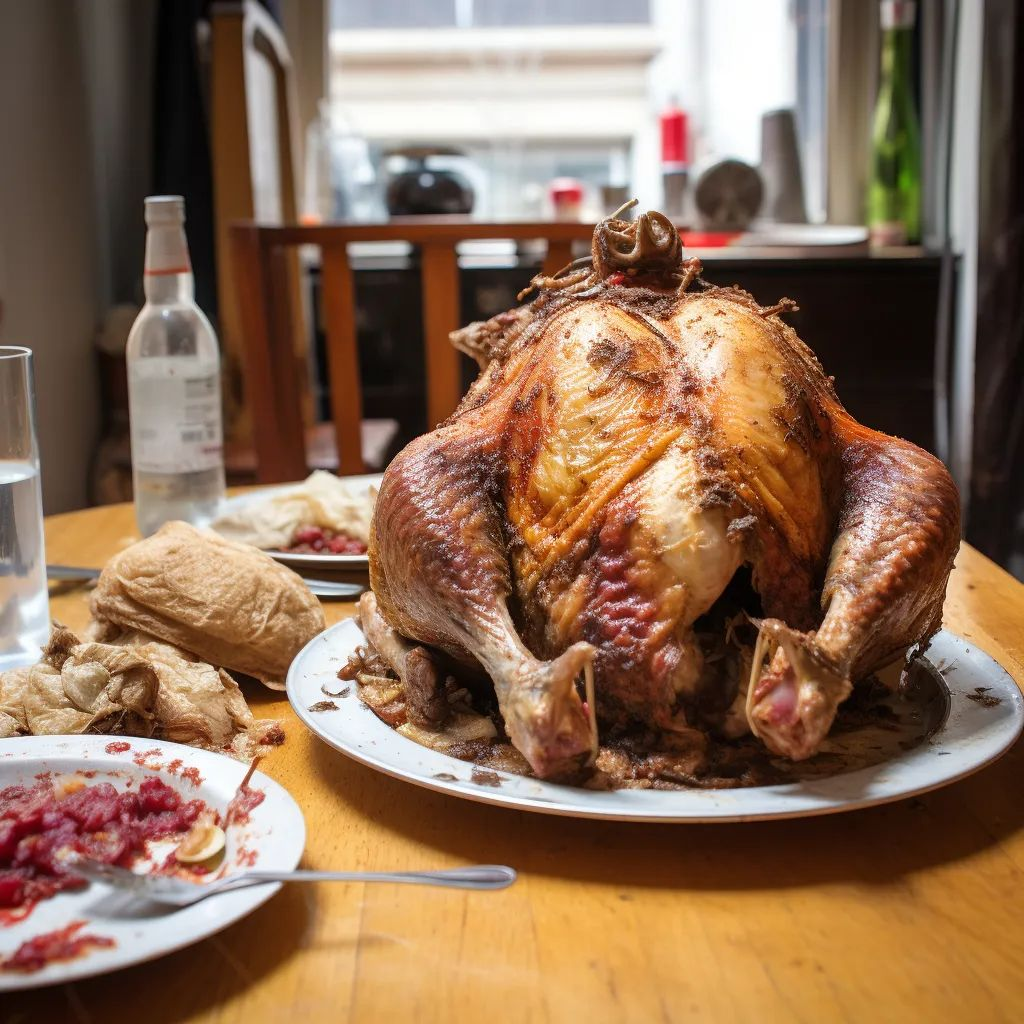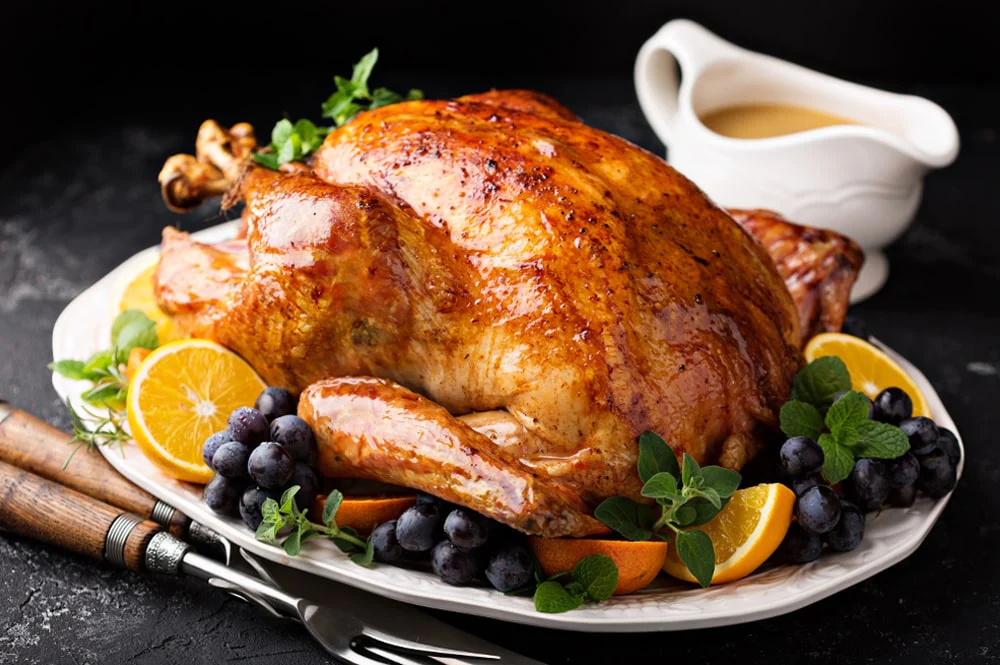Turkey is often the star of many holiday feasts, but after the celebration ends, the question of whether it’s safe to eat the leftover turkey that’s been left out overnight arises. It’s a common scenario, especially after big meals like Thanksgiving or Christmas. In this article, we’ll dive into food safety guidelines to determine whether or not you can safely consume that turkey sitting on the kitchen counter.

Food safety is no joke—especially when it comes to perishable items like poultry. Let’s break down the key factors you need to consider when deciding whether your turkey is still good to eat after being left out overnight.
Understanding the Danger Zone for Bacterial Growth
The first thing to understand about food safety is the “Danger Zone.” This refers to the temperature range between 40°F (4°C) and 140°F (60°C), where bacteria thrive. When turkey, or any perishable food, is left in this temperature zone for more than two hours, harmful bacteria such as Salmonella and Staphylococcus aureus can multiply rapidly. If your turkey sat out overnight, it has spent too long in this danger zone, making it unsafe to eat.
But why exactly is this danger zone so important?
When food sits in temperatures between 40°F and 140°F, the bacteria that can cause food poisoning grow at an alarming rate. Within just a few hours, millions of bacteria can develop, leading to a higher chance of contamination and illness. Even if your turkey doesn’t look or smell spoiled, it could still be unsafe.
Factors That Affect Food Safety
- Bacterial Growth Bacteria grow exponentially when food is left out at room temperature. Even if the turkey was cooked thoroughly, leaving it out overnight allows harmful pathogens to develop, which can lead to foodborne illnesses like food poisoning. Symptoms might include nausea, vomiting, and stomach cramps—definitely not worth the risk.
- Room Temperature The actual temperature of the room plays a significant role. If you left your turkey out in a hot room, say above 90°F (32°C), bacteria could grow even faster. In such conditions, food can become unsafe within just one hour, making it extremely risky to eat.
- Size of the Turkey Portion Another important factor is the size of the turkey portion. Larger chunks or whole birds take longer to cool down. If the turkey is still warm after hours of sitting out, it’s been in the danger zone too long. Cutting turkey into smaller pieces after the meal helps cool it down faster and prevents bacteria from growing.
- Prior Handling Safe food practices don’t start after the meal—they begin before and during cooking. Cross-contamination, improper storage, or undercooking can all increase the risk of bacterial contamination in your turkey. If it wasn’t handled properly before being left out, the risk is even higher.
Safe Practices for Storing Leftover Turkey

To keep your leftover turkey safe for consumption, you need to act fast and follow some simple rules. Here’s how to make sure your turkey stays safe:
- Refrigerate Promptly Leftover turkey should be stored in the refrigerator within two hours of cooking. This helps keep it out of the bacterial danger zone. Always cut the turkey into smaller portions before storing it, as this helps it cool down faster.
- Proper Packaging Wrap the turkey tightly in foil or plastic wrap, or use airtight containers to prevent exposure to air. This limits bacterial contamination and keeps your turkey fresher for longer.
- Check Refrigerator Temperature The fridge should be set below 40°F (4°C) to effectively prevent bacteria from growing. It’s a good idea to check the temperature periodically to ensure it stays in the safe zone.
- Reheating Leftover Turkey When reheating, make sure the turkey reaches an internal temperature of 165°F (74°C). This temperature kills any bacteria that may have developed while the food was stored.
- Consume Within a Few Days Eat your leftover turkey within three to four days of refrigeration. If you’re not going to finish it within that time frame, freezing it is a better option.
The Risks of Eating Turkey Left Out Overnight

Now, let’s address the core question—can you eat turkey that’s been left out overnight? In short, no. Leaving turkey out for an extended period—especially overnight—gives bacteria plenty of time to multiply. Even if it looks and smells fine, it could still harbor harmful pathogens that can cause serious foodborne illnesses.
The “when in doubt, throw it out” rule definitely applies here. If you left your turkey out overnight, don’t take the risk of eating it. The potential for illness far outweighs the desire to save leftovers.
What to Do if You’re Unsure
If you’re unsure whether your turkey has been left out too long, here’s a quick checklist to follow:
- Has it been left out for more than two hours?
- Was the room temperature above 40°F?
- Did the turkey sit out in warm conditions or direct sunlight?
- Did the turkey cool down properly after cooking?
If the answer to any of these questions is “yes,” then it’s safest to throw it away. Don’t rely on sight, smell, or taste alone—bacteria are invisible and often don’t cause noticeable spoilage.
Conclusion: Safety First, Always
When it comes to leftover turkey—or any perishable food—the best advice is to play it safe. Eating turkey that has been left out overnight puts you at risk for foodborne illness, even if the food looks fine. By following proper food storage guidelines and understanding the bacterial danger zone, you can enjoy your leftovers safely.
In the end, it’s not worth the gamble. If you ever find yourself questioning the safety of your turkey, remember this simple rule: when in doubt, throw it out. It’s better to be safe than sorry!


